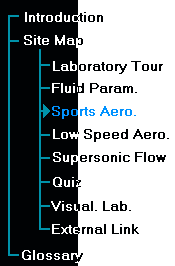

|
 |
Fluid Low Speed AerodynamicsHow To Use the Simulation Program
Choose type of flow element, its strength and
position. Then press "Add To."
If a free stream is to be superposed, choose "Uniform Flow",
the free stream direction in degrees and the magnitude of its velocity.
Either type "Clear All" to start over again, or "Delete" a
selected flow element.
If a uniform flow is to be superposed, clear and click the "Uniform Flow"
button one more time.
Choose "Velocity Vector" or "Bar" to visualize the flow field. Velocity
components will be shown where the mouse is located. Move your mouse to a
desired location and click the mouse, then additional velocity vectors
or flow direction vetors will be drawn.
By choosing "Streamline" basic streamlines will automatically be drawn.
(Depending on your machine, this may take a while to be completed. It is
best to finish selecting all the flow elements first while in Velocity Vector
or Bar modes.)
Click anywhere of your interest within the frame to display an additional
streamline passing through that point. The direction of the flow will
also be shown.
Fine points:
At exact points where the velocity is unbound, such as at the center of a
source or a vortex, the program will display (u, v)=(0, 0) but you should
be able to distinguish them from the actual stagnation point s where the
velocity actually vanishes.
Streamlines near the negative x-axis may appear thick or otherwise different
because of a certain mathematical nature of the stream function.
Fine points:
At exact points where the velocity is unbound, such as at the center of a
source or a vortex, the program will display (u, v)=(0, 0) but you should
be able to distinguish them from the actual stagnation point s where the
velocity actually vanishes.
Streamlines near the negative x-axis may appear thick or otherwise different
because of a certain mathematical nature of the stream function. Back to Superposition of elementary flows |

|

|